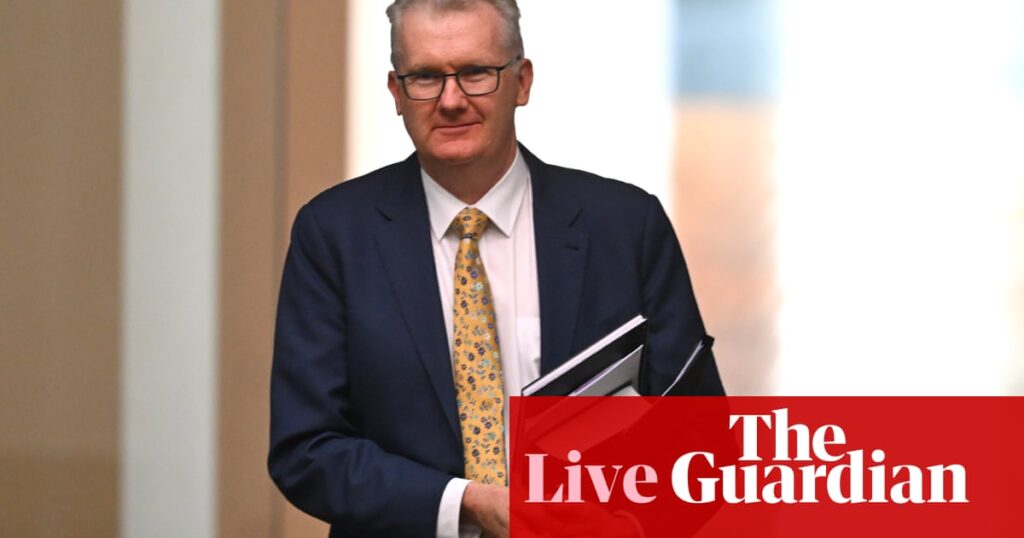Labor pushes three controversial migration bills
Paying countries to accept deported non-citizens, banning mobile phones in immigration detention and barring entry of people from certain nations to Australia are all part of the government’s legislative push before year’s end, AAP reports.
Independents, the Greens, legal experts and human rights advocates have condemned the three bills, with the Asylum Seeker Resource Centre dubbing them “a cruelty package”.
The government doesn’t have a majority in the Senate and will most likely find support from the coalition to get the legislation across the line.
Proposed amendments to the Migration Act seek to deport non-citizens, including people not convicted of crimes and to pay third countries for their part in the removals regime.
An inquiry revealed more than 80,000 people could be affected but the Department of Home Affairs maintains the legislation impacts about 5000 people on bridging visas and another 1000 in immigration and community detention.
It would grant extensive immunity to government officials and those in third countries involved with the removals as well as reversing protection findings for refugees.
Key events
Bowen says Australia is meeting climate targets
The climate change and energy minister, Chris Bowen, has been making the rounds on breakfast programs as the government claims it is on track to meet its legislated 43% emissions reduction target by 2030.
As Adam Morton reports, the government said annual emissions projections suggest national climate pollution would be at least 42.6% less than 2005 levels by the end of the decade, compared with 37% last year.
Bowen told ABC News Breakfast that “all the analysis shows it’s going to have the impact that we need to to meet our targets.”
What about the target of 82% of power from renewables by 2030? Bowen said Australia is on track to meet this:
Yes, and the capacity investment scheme that we’ve been rolling out has been working even better than we thought it would. Just in the last quarter, we’ve seen more investment in renewable energy than we did in all of last year … and so we are seeing very significant step-ups in renewable energy investment.
We’re working very closely with all the states and territories with renewable energy transformation agreements to make sure that our systems are working together on all the planning elements, for example, to get the energy built. The answer is yes – the things we’ve put in place are working to achieve both targets.
Education minister hopes for ‘broad agreement’ on under-16 social media ban
On the under-16s social media ban bill, Jason Clare said he hopes there is “broad agreement across the parliament on this one”.
As Josh Butler reports, several Coalition members have raised alarm about the privacy implications of the bill, with concerns over whether platforms such as Facebook or TikTok would require personal documents to verify a user’s age.
Clare told the Today show he thinks this “should be above politics”:
We want to work with the opposition on this legislation, and we’re under no illusions … that this is going to be perfect or that it’s going to stop every young person from getting access to social media, but it will get it out of the hands of most young people, and that’ll take the pressure off a lot of mums and dads.
Changes to Hecs indexation passed parliament last night
The education minister, Jason Clare, spoke with the Today show earlier after changes to how the Hecs indexation is calculated passed parliament last night.
He said the changes will be backdated to June last year, and those with a debt of $27,000 will wake up with about $1,200 taken off that – “so that’s a good start”.
Clare was asked about a report in the Financial Review saying the changes would add $9bn to the budget, along with Labor’s plan to cut student debt by 20%. He told the program:
Well, this is the way Hecs works. It’s a loan to Australian students – 3 million of them – and they pay that back once they start earning. At the moment [it’s] about $54,000, but we’re going to increase that to about $67,000.
The fact is that universities got a lot more expensive over the last 20 years than it was when you and I went to university, and it’s meant that, for a lot of young people, it’s got harder to pay off that debt and to get a loan to buy a house. So we want to make it a bit easier.
Previous coverage on government’s migration bills
Just circling back to news earlier that the government is seeking to push three controversial migration bills through the Senate, during these final two sitting days.
We have covered this trio of migration bills extensively. Guardian Australia understands that the Coalition and Labor are closing in on a deal to pass all three, due to be debated today.
Paul Karp wrote this explainer on the bills, for all the much-needed context for the day ahead:
For more on the prohibiting items in detention bill specifically, you can read more here. On the migration amendment bill, you can have a read here, and the deportation bill, here.
Cait Kelly
Thousands on jobseeker lacking essentials because welfare payments so low: report
Thousands of people on jobseeker and sole parents are lacking two or more essential items including stable housing, yearly dental checkups or $500 in emergency savings because the welfare payments are so low, a new report from the Australian Council of Social Services has revealed.
The Acoss report found about one in two people relying on jobseeker and one in three sole parents are experiencing multiple material deprivation, compared with about one in 12 people nationally.
The majority of people living below the poverty line (81%) are experiencing material deprivation, with private renters twice as likely to experience “multiple deprivation” compared with the general population (19%).
The Acoss chief executive, Dr Cassandra Goldie, said people receiving income support are “experiencing multiple material deprivation at rates that far exceed the general population”.
This tells us that jobseeker, youth allowance and related payments are so woefully low that people can’t afford the basic essentials of life.
The extremely high rate of deprivation among people with low wealth and low incomes (81%) – such as students – shows the important role that wealth plays as a protection against poverty.
In its upcoming budget, the federal government must raise income support payments to livable levels, fix employment services, boost social housing and enact a jobs, services and training plan to reduce long-term unemployment. These policies will go a long way to reducing poverty and material deprivation across Australia.
Peter Hannam
More on the labour market as CPI results loom
We’ll get the government’s updated GDP, employment and budget forecasts in the week of 16 December when it releases its midyear economic and fiscal outlook … and perhaps Seek’s optimism will be reflected there.
Less optimistic, though, are investors about a near-term RBA rate cut. At present, there’s only a 9% chance of 25 basis-point cut when the final RBA board meeting for 2024 wraps up on 10 December. On present guesses, that first rate reduction won’t land until perhaps May or July next year.
They are only guesses, though. Today’s monthly inflation figures from the ABS, out at 11.30am Aedt, may shape those estimates. Banks such as CBA are predicting the headline CPI rate for October remained at 2.1%, or snuggly at the low end of the RBA’s 2%-3% target band.
Underlying inflation – which currently is a bit different from the headline rate because of government handouts for energy and some rent – will probably edge up to 3.4% from September’s 3.2%, CBA predicts.
These are only the monthly numbers – rather than the more comprehensive quarterly ones – but they’ll nevertheless create a bit of a flurry of headlines in about four hours’ time.
Peter Hannam
Labour market steadying as latest monthly CPI result looms
The consensus for much of the year has been the Reserve Bank’s 13-year high interest rates would squeeze demand in the economy, nudge up unemployment and help bring down inflation. And then it could start cutting its cash rate.
Well, the labour market we know has been performing better than expected for a while. A new report out from Seek, the employment website, now finds conditions have stabilised – if not actually improved a bit in recent months.
“Our summary measure suggests that the labour market after loosening since 2022 has tightened since late 2023 and is now broadly balanced,” the report – the first of a regular survey by senior economist Blair Chapman – finds.
Full-time employment growth and hours worked were declining last year but by the first half of this year conditions became more neutral. Chapman said:
And then more recently, we’re actually starting to see [the labour market] tighten.
Supporting demand for workers even in a slowing economy has been the “elevated” demand for roles in healthcare & medical, community service & development, and manufacturing, transport & logistics, SEEK said. Less in favour, though, are the information & communication technology and banking & finance industries, which have fallen below their pre-Covid levels.
And in the background is the pent-up demand for construction – especially houses – that should provide more work once the wave of insolvencies ebbs.
Cait Kelly
Cost of living crisis has ‘reshaped’ how Australians approach housing: Flatmates survey
Continuing from our last post: Flatmates.com.au product manager Claudia Conley said the cost of living pressures of the past 12 months has “reshaped how Australians approach housing”, with 43% of respondents saying affordability constraints have pushed them into share accommodation.
Additionally, 35% of renters have faced rent increases in the past six months, with half of these hikes exceeding expectations, highlighting the growing financial strain on tenants.
With 57% of respondents struggling to keep up with rent payments over the past year, the effects of the rental crisis remain present for many Australians. Furthermore, the sentiment among 55% of survey respondents that property ownership is out of reach for young people highlights the growing sense of uncertainty about long-term housing security.
Cait Kelly
Growing number of Australians over 55 moving into sharehousing
More than half the nation’s renters are feeling the pinch, with 57% struggling to meet their rent payments, up 14% from 2023, according to one of the largest annual tenant surveys.
The annual Flatmates.com.au National Share Accommodation Survey interviewed 87,000 tenants across the country and found a higher proportion of members aged over 55 are entering share housing (up 7% from 2023), as the 75+ age group was the fastest growing demographic in 2024.
Of those who are over 55, one in two (51.6%) stated the cost of living and being unable to afford to live alone as their reason for entering share house living, while one in 10 were doing so for companionship.
Showing the pinch some mortgage holders are feeling, 36% of respondents who identified as homeowners decided to offer their home as a share house for the first time in the past 12 months.
New bill to ramp up fines for grocery code breaches
Jonathan Barrett
The federal government will introduce legislation into parliament today that threatens supermarkets with multimillion-dollar fines for breaches of a revamped grocery code of conduct.
The legislation stems from a recent review of the code, which governs how food retailers deal with suppliers, amid heightened concern over pricing practices at Australia’s major chains, Coles and Woolworths.
The bill allows for maximum penalties for any harmful breaches of the code of up to $10m, three times the benefit gained from the contravening conduct, or 10% of turnover in the preceding 12 months.
It also gives the competition regulator additional powers to issue infringement notices for code breaches. The prime minister, Anthony Albanese, said in a statement the government had “put supermarkets on notice”.
We want to see a fair deal for Australian families at the checkout, and a fair deal for our farmers.
Australia’s big supermarkets have faced intense scrutiny over their grocery prices, and relationships with farmers, drawing criticism from all political parties before an election expected to be fought over cost-of-living issues.
Coles and Woolworths have consistently defended their business practices, and pointed to the long-term trading relationships they have with many Australian farmers.
Good morning
Emily Wind
Emily Wind here, signing on for blogging duties – many thanks to Martin for getting us started this morning.
We’ve reached the second-last day of the parliamentary sitting year, and it’s bound to be jam-packed. You’ll have the whole Canberra team bringing you the latest – Karen Middleton, Paul Karp, Josh Butler and Sarah Basford Canales, as well as Mike Bowers capturing all the action.
Let’s get into it.
Full Story podcast: Unpicking Dick Smith’s strident views on renewables
When climate and energy policy is in the news, it’s not always easy to decipher what’s accurate and what’s not.
An interview with Dick Smith broadcast around the country on a long-running ABC radio program earlier this month caused environment and climate correspondent Graham Readfearn to raise an eyebrow. He examines the millionaire businessman’s claims about renewable energy and why his comments matter.
Julian Assange’s family to lobby PM to put pressure on Biden over pardon
Campaigners for Julian Assange hope the prime minister can put pressure on the outgoing US president, Joe Biden, to deliver a pardon for the WikiLeaks founder, AAP reports.
Assange’s wife, Stella, and his brother, Gabriel Shipton, will be in Canberra today to lobby MPs for support in placing diplomatic pressure on America for a pardon to be granted during the dying days of the Biden administration.
A multi-partisan group of MPs had been instrumental in helping to raise the plight of Assange and secure his release from custody on espionage charges after years behind bars.
Shipton said time was running out for a pardon to be secured before Donald Trump was sworn in as president in January:
The parliament was integral to getting Julian out and they were the key to unlock his cell basically, and they can continue and finish the job and push for this pardon.
There’s a ticking clock going on for when the president can make the decision to pardon Julian.
It really is in the power of President Biden to unwind this precedent that originated with the Trump administration. [A pardon] would be a real coup for the prime minister.
More on that legislative agenda, via AAP
Continuing from our last post: the home affairs minister, Tony Burke, introduced another bill that would confiscate mobile phones from detainees and use sniffer dogs in immigration detention centres.
Jason Donnelly, a prominent immigration barrister, said:
The broad and discretionary determination of ‘prohibited items’ by the minister, including items like mobile phones, risks arbitrary and inconsistent application.
The minister said the powers were needed to end a “prison-like” culture.
The third bill, which Labor first introduced in March before being shot down, gives the home affairs minister unilateral power to ban visa classes for relatives of asylum-seekers from blacklisted countries that don’t accept deportees.
People from Iran, Iraq, Russia and South Sudan had been floated as possible targets of the ban but no exhaustive list has been released by the government.
The Greens, who described it as a “Trump-style ban”, along with the Coalition and crossbench previously blocked the legislation.
Labor pushes three controversial migration bills
Paying countries to accept deported non-citizens, banning mobile phones in immigration detention and barring entry of people from certain nations to Australia are all part of the government’s legislative push before year’s end, AAP reports.
Independents, the Greens, legal experts and human rights advocates have condemned the three bills, with the Asylum Seeker Resource Centre dubbing them “a cruelty package”.
The government doesn’t have a majority in the Senate and will most likely find support from the coalition to get the legislation across the line.
Proposed amendments to the Migration Act seek to deport non-citizens, including people not convicted of crimes and to pay third countries for their part in the removals regime.
An inquiry revealed more than 80,000 people could be affected but the Department of Home Affairs maintains the legislation impacts about 5000 people on bridging visas and another 1000 in immigration and community detention.
It would grant extensive immunity to government officials and those in third countries involved with the removals as well as reversing protection findings for refugees.
Welcome
Good morning and welcome to our live politics blog. I’m Martin Farrer with some of the top overnight stories and then it’ll be Emily Wind on deck.
The Albanese government is closing in on a deal to pass three migration bills that have been introduced to before parliament, including paying third countries to take people who can’t be deported, and creating powers to confiscate mobile phones in detention. The bills are listed to be debated today, but asylum seeker advocates have dubbed them a “cruelty package”.
Meanwhile the government will claim it is on track to meet its legislated 43% emissions reduction target by 2030 after a departmental analysis found it had improved its position over the past year. It comes as ministers launched a review of how the power grid can accelerate the take-up of renewables when existing support ends.
And supporters of Julian Assange are in Canberra today campaigning for the prime minister to put diplomatic pressure on the US to pardon Assange. More on that soon.
Premium IPTV Experience with line4k
Experience the ultimate entertainment with our premium IPTV service. Watch your favorite channels, movies, and sports events in stunning 4K quality. Enjoy seamless streaming with zero buffering and access to over 10,000+ channels worldwide.

















